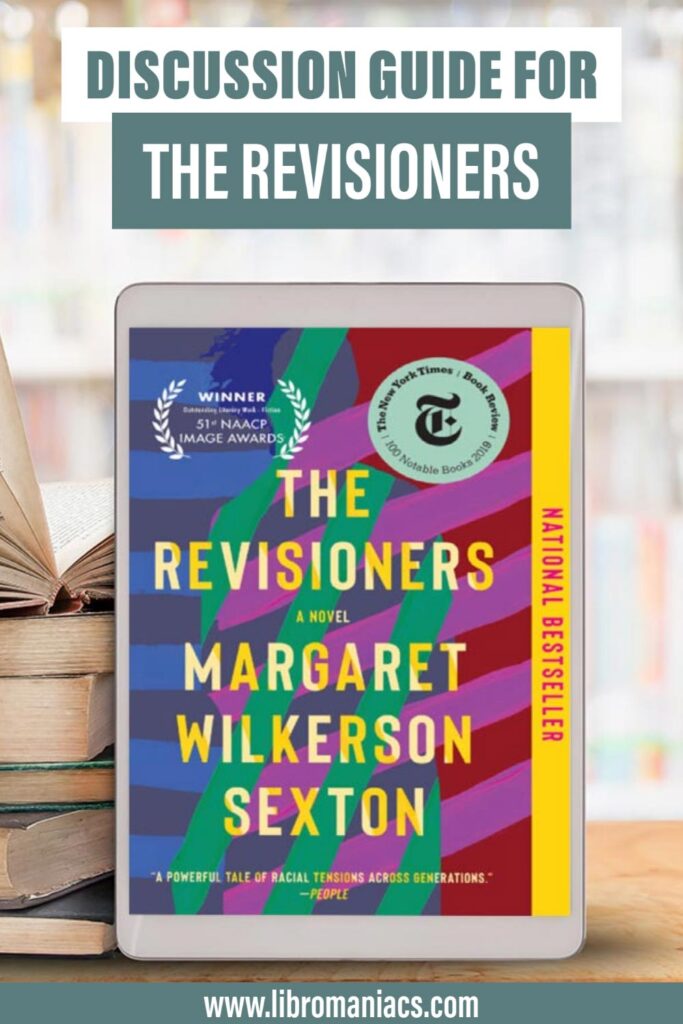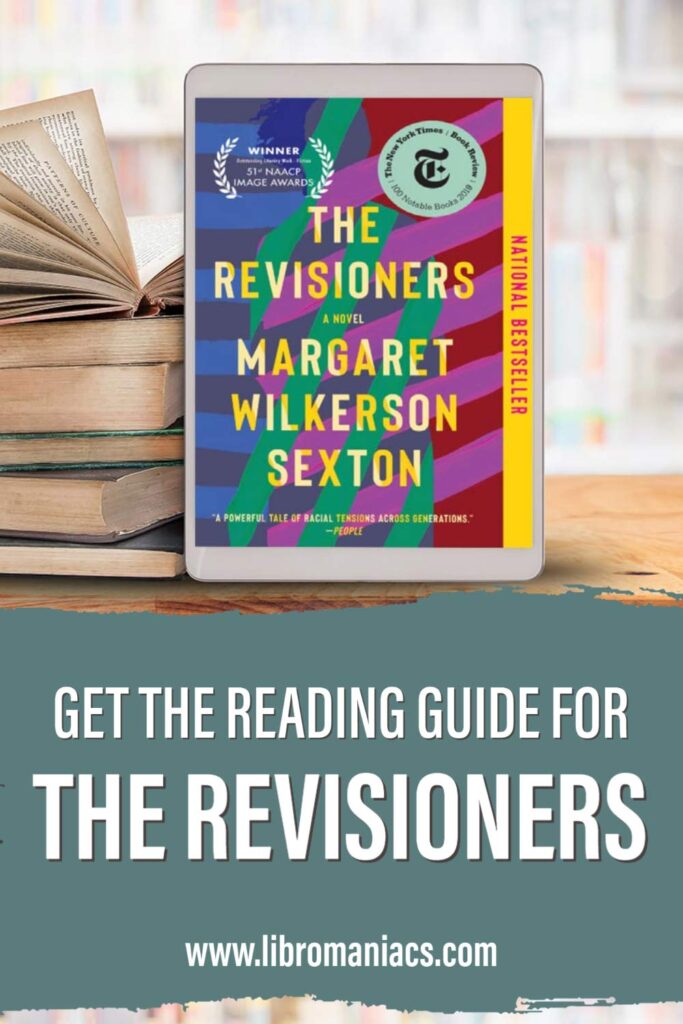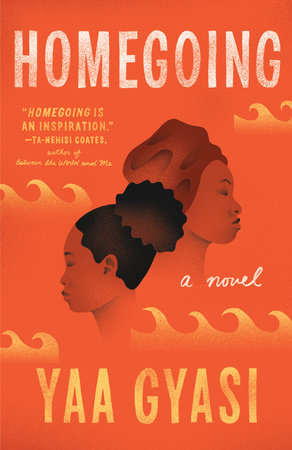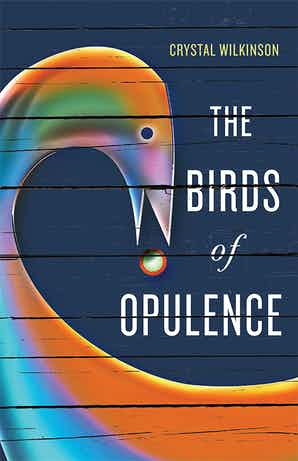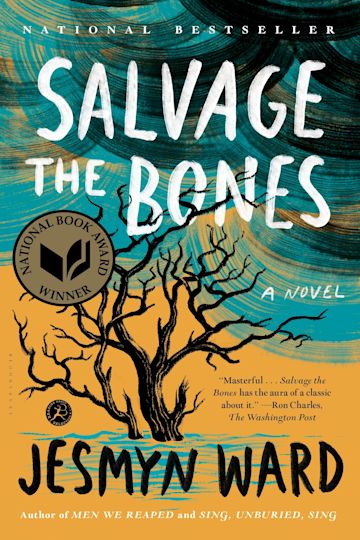There is a very strong vein of female energy coursing through this multi-generational story. The book starts with modern day Ava, but it unspools back to 1855 and the life of her great-great grandmother Josephine.
The Revisioners presents themes of racism, female resiliency, intergenerational trauma, personal reinvention, blended families and elder-care issues. And if you are hosting a book club discussion for The Revisioners, you will not want for something to talk about.
Our guide will help you get the conversation moving. Get started with The Revisioners book club questions and our guide, which also includes a synopsis and some selected reviews. If you liked the book, keep scrolling because we also recommend an additional 3 books like The Revisioners.
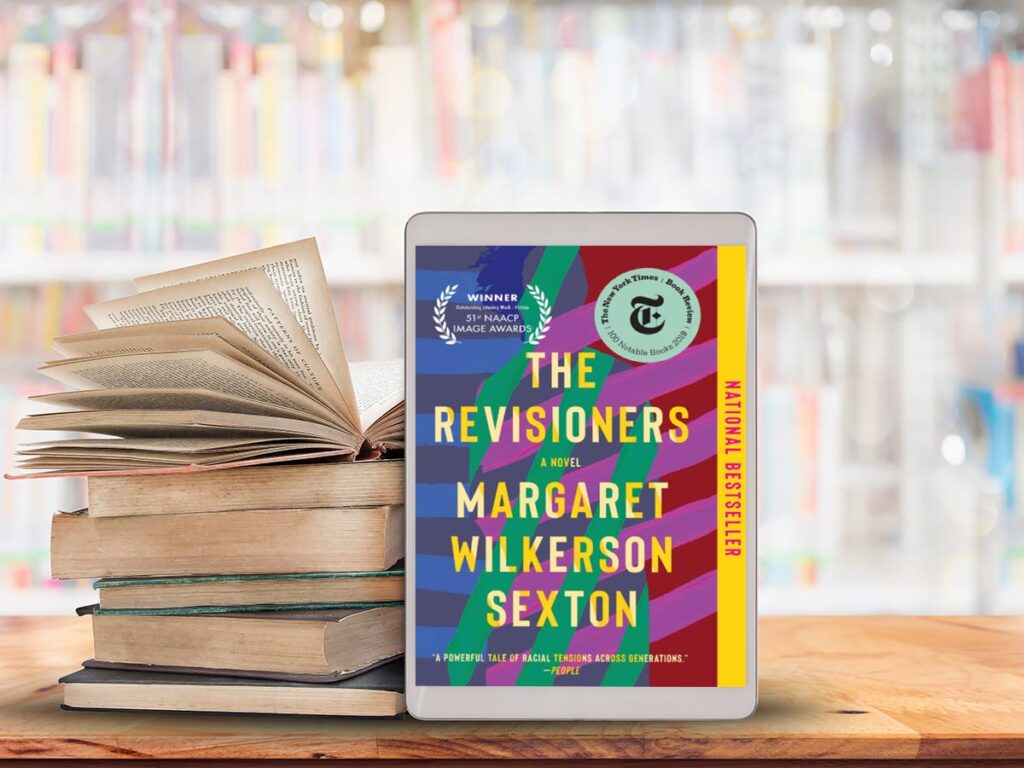
The Revisioners Synopsis
The Revisioners, By Margaret Wilkerson Sexton
In 1924, Josephine is the proud owner of a thriving farm. As a child, she channeled otherworldly power to free herself from slavery. Now her new neighbor, a white woman named Charlotte, seeks her company, and an uneasy friendship grows between them. But Charlotte has also sought solace in the Ku Klux Klan, a relationship that jeopardizes Josephine’s family.
Nearly one hundred years later, Josephine’s descendant, Ava, is a single mother who has just lost her job. She moves in with her white grandmother, Martha, a wealthy but lonely woman who pays Ava to be her companion. But Martha’s behavior soon becomes erratic, then threatening, and Ava must escape before her story and Josephine’s converge.
The Revisioners explores the depths of women’s relationships—powerful women and marginalized women, healers and survivors. It is a novel about the bonds between mothers and their children, the dangers that upend those bonds. At its core, The Revisioners ponders generational legacies, the endurance of hope, and the undying promise of freedom.
The Revisioners Book Club Questions
- The book’s opening epigraph quotes Maya Angelou–“I go forth alone and stand as ten thousand”. It’s from her poem “The Grandmothers”. Why do you think that Sexton chose the quote and how is it significant to the story?
- As they move into Martha’s house, King says to Ava “I’m telling you, I have a bad feeling about this house. Didn’t you feel it when you walk in? It’s like walking into a refrigerator and closing the door behind you…I have a bad feeling about her”. What kind of vibe did you get from the house? And how did you feel about Martha?
- Ava’s mother certainly wasn’t fond of Martha either. She was concerned about the latent racism that was lurking within Martha. She warned Ava about Martha, reminding her that ““You have the power of your ancestors coursing through your veins.” What did she mean by that?
- Josephine has created a successful farm and is the matriarch of her community. And yet, any breach of the restrictive Jim Crow etiquette could mean disaster. This is brought to stark relief when the Klan comes calling. Discuss the various ways that Josephine was forced to negotiate or compromise in order to avoid that disaster.
- Both Ava and Josephine have lost their husbands. One to death and the other to divorce. Women like them are often called resilient, but carrying on isn’t easy. From where does each woman draw her strength to carry on? How are they similar and how are they different?
- There are definitely some mystical elements in The Revisioners. Most notable is Josephine’s abililty to visualize things in order to make them happen, a “second sight” if you will. Is this magical realism. Or was it simply magical thinking on the part of a small girl who lacked agency?
- Racism has a long reach, and even in modern day New Orleans, strains of a racist Deep South affect Ava’s life. Discuss the ways that racism surfaced. (Hints: King’s novelty status at school, gentrification of her mom’s neighborhood, Martha’s unfiltered racist comments.)
- There is a field of study in social work called intergenerational trauma. “The people at the highest risk of trauma and those with the most difficulty working through it have experienced their own trauma but also have come from a family where there was a trauma in their parents and often in their parents’ parents,” says Stephanie Swann, PhD. Did you see an intentional thread of intergeneration trauma through the story? If so, what are some specific examples?
- The book is only 280 pages, but it packs a lot of story. Was there enough there, there?
- Why do you think that Sexton chose to call the book The Revisioners?
Selected Reviews of The Revisioners
“Sometimes it’s startling to see how much history is so much a part of the present. This is a powerful story about how the prejudice of the past has in many ways not dissipated as some may think and as many of us hoped…Throughout I kept wondering how Ava would connect to her great-great-great grandmother Josephine and I was not disappointed in how Sexton brings this full circle in some stunning moments.”
“This book looks at how dangerous white privilege is, and how quickly it can tip into expressions of white power and devastating entitlement…And this book holds a very honest mirror up to the lurking danger of white supremacy that is often just below the surface of neighborliness, friendliness, good intentions, and even love.”
“It is not easy to craft a book covering 160 years of changing social & racial landscapes and Margaret Wilkerson Sexton’s novel, The Revisioners demonstrates tangible ability & a considerable flair for words but ultimately left me feeling undernourished by a framework that may presently be beyond the reach of a young author.”
“I wanted more time in each story to see these characters through to their next chapters. Although an uneven experience for me, I found this a worthy, lovely read.”
3 Books Like The Revisioners
Another book that explores the legacy of slavery is The Invention of Wings (Sue Monk Kidd) and Horse (Geraldine Brooks), and Let Us Descend (Jesmyn Ward).
If you enjoy exploring Black voices, we also have book club guides for Girl Woman Other, Such a Fun Age, Caste, The Heaven and Earth Grocery Store and Born a Crime. And for more historical perspective, check out The Lincoln Highway. All of these articles have related reads on the bottom, so you’ll get lots of inspiration.
Homegoing, by Yaa Gyasi
If you are interested in more multi-gen African American family sagas, then you should definitely read Homegoing.
It’s an Oprah book pick and a Pen/Faulkner award winner. The book covers the 250 year history of two half-sisters who were born on Ghana’s Gold Coast, which was a major export center for slaves to the United States. The book’s format is like a family tree of subsequent generations, and the book illustrates how the legacy of slavery plays out across history, both for the enslaved and for those complicit in the slave trade.
The Birds of Opulence, by Crystal Wilkinson
The book covers four generations of women all living under one roof in a bucolic southern black township in Kentucky. Their stories are told in a series of vignettes as each woman is touched by trauma or mental illness, having either caused it or grappled with it their entire lives. The book has a strong sense of place and a lyrical writing quality.
If you liked the mystical elements of The Revisioners, this book has no small dose of magic, conjuring, spells and ghosts.
Salvage the Bones, by Jesmyn Ward
This National Book Award winner pulls absolutely no punches. Rather, it delivers them right into your solar plexus. The book is a wrenching look at the lonesome, brutal, and restrictive realities of rural poverty. And its informed by Ward’s own experience during Hurricane Katrina.
14 year-old Esch is just trying to hold it together. She’s pregnant, her father’s a drunk, she and her brothers can barely scrape together enough food and there is a hurricane brewing. The book covers a narrow period just before and during the storm and it’s an emotional ride.
Share The Revisioners book club questions on Pinterest:
